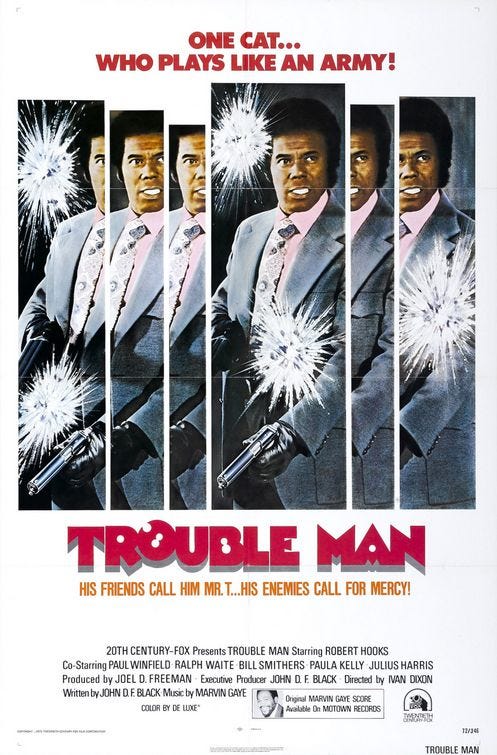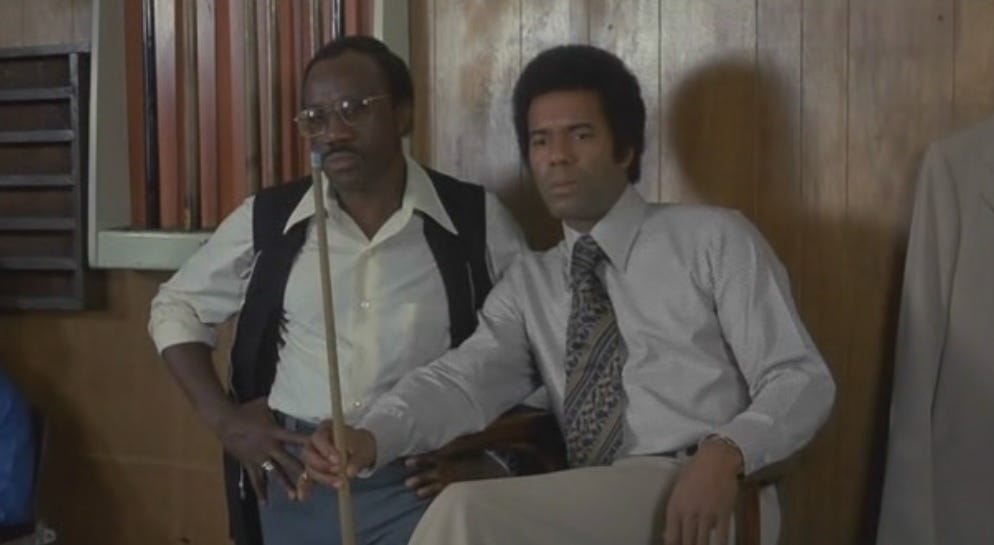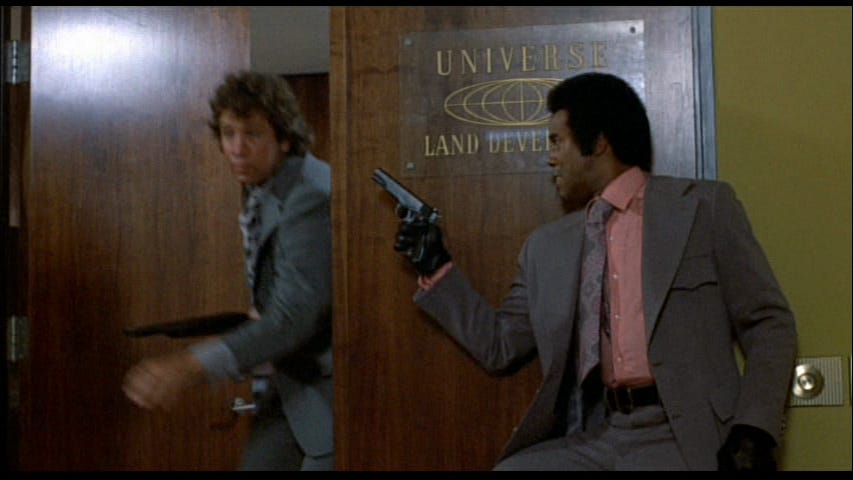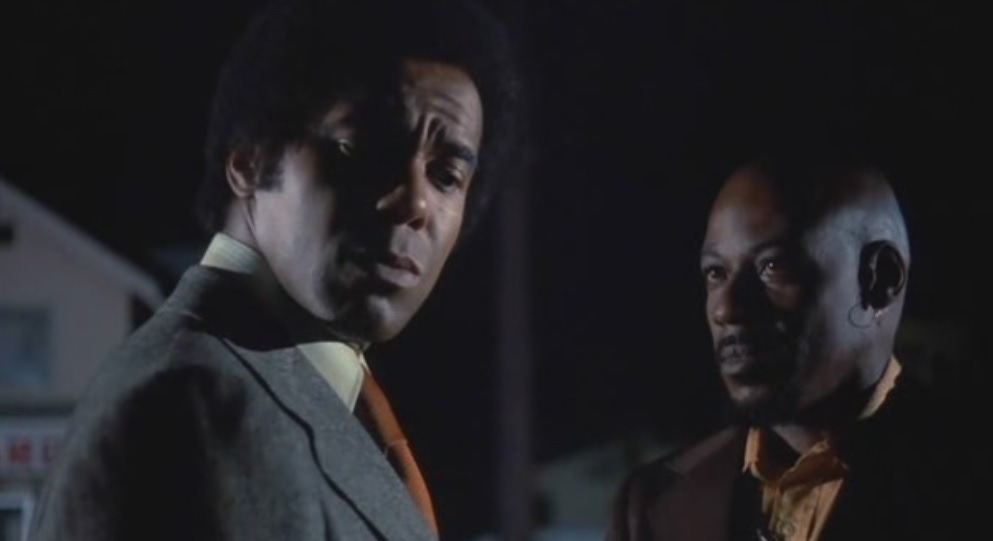Blaxploitation Education: Trouble Man
One of the best movies in the genre, a well-written crime thriller with another great Black hero.
Trouble Man
Written by John D.F. Black
Directed by Ivan Dixon
1972
Some of the best crime stories drop their audience into a fully fleshed-out underworld that seems like it could plausibly be operating right under the noses of law-abiding society. While the plot of a story may hinge on a particular heist, a criminal scheme, or an act of violence, you get the sense that you’re just getting a glimpse into a world that most people are never going to be a part of. Gangsters and other criminals engage in all sorts of activity, some of which is egregiously illegal, but much of which is just slightly outside the bounds of the law. It’s a world that’s dangerous, but also exciting, featuring characters that range from desperate small-time crooks to more powerful figures who are ready to put down any threats that might jeopardize their operations.
That’s the type of setting we get in Trouble Man, which is an especially good example of the cool crime stories that the genre often told back in the 70s. Its main character, played by Robert Hooks, is only known as Mr. T (whether he served as an inspiration for a more famous guy with that name is unknown), and while he’s involved in the criminal underworld, he’s an independent operator who isn’t beholden to anybody. He seems to care more about doing what’s right than trying to make a buck or exercising power over anyone else. He hangs out at a local pool hall, where he seems to be known as the best player around, but he doesn’t make a big deal about it, mostly sitting back and waiting for people to challenge him. When a kid shows up from out of town to challenge him, T just lets the guy defeat himself and lose a $500 bet by scratching a shot on the 8-ball.
We get an idea of Mr. T’s morals when his friend informs him of a sad situation in which a woman and her baby in the local neighborhood were injured because the railing on the stairs to their apartment collapsed due to the poor upkeep of the building by the landlord. Even though T has other business, he makes a quick stop at the company managing the apartment building and threatens the guy there, telling him he better head over to the hospital, pay the woman’s medical bills, apologize for the shitty job they’ve been doing, and get their property fixed up.
While that’s meant to show us that Mr. T is the kind of person who looks out for the community, we also get an idea of how he really makes money, being sort of a freelancer who takes care of business for other criminals. The main plot of the movie kicks off when a couple gangsters, a Black guy named Chalky (Paul Winfield, Sounder) and a white guy named Pete (Ralph Waite, The Waltons) hire him to help them figure out who has been robbing their gambling operations. He lets them know that he’ll scope out the games they’re running during the time that they expect a robbery to happen, learn as much as he can about the robbers, and do what’s necessary to track them down. For payment, he wants one night’s take from their operations. When they offer $1,000, he says he won’t do it for less than “10 big ones.”
This seems like it could go somewhere interesting, but things immediately become more intriguing when we learn that this is all a setup. The gangsters end up framing Mr. T for killing one of the robbers, who happens to be working for Big (Julius Harris, who was in Super Fly and will be showing up in several more movies in this series), another gangster across town. And that’s the real plot of the movie: T has to find out what’s going on, trying to work out all the angles and figure out who set him up while also dealing with suspicion from the cops. As he learns more about the scheme against him, he ends up embarking on a righteous, violent mission of revenge, becoming exactly the capable, efficient force of death and destruction that the criminals in the city are afraid of.
The real pleasure in all of this is watching Mr. T handle everything that gets thrown at him smoothly, barely breaking a sweat as he gets the drop on guys who try to hold him up, comes up with a way to get out of being framed for murder even though the evidence against him is incredibly strong, sneaks into multiple gangsters’ hideouts without being discovered, and overpowers every thug that gets sent to kill him. It’s beautifully put together, full of nice details about how he handles the various problems that he encounters and accomplishes his goals, all while avoiding giving the police anything that could be incriminating.
This story is good enough that it could stand alongside crime novels by the likes of Donald Westlake as a portrait of the type of highly capable and completely ruthless criminal who gets the job done so perfectly that you just want to applaud once it’s over. Much of the pleasure comes from the specificity of the details. This underworld is kind of low-rent, as much as the various gangsters and crooks try to make it seem like they’re a big deal. Big operates out of an office in a bowling alley, while the guys who hire and frame Mr. T have their headquarters somewhere in the depths of a garment factory. The gambling operations they run are just a room in a shitty apartment where guys throw some dice at the wall. But even as these guys fight for territory, T strides comfortably and confidently through every room he enters, content in his standing as the biggest badass and the guy who should command the most respect.
I’m actually kind of surprised that this movie isn’t better known. It seems like it may just be missing that extra something that caused movies like Shaft to really grab the public’s imagination. While Robert Hooks is very good, conveying effortless cool and a grim assurance that he’s going to come out on top, he’s fairly humorless, and he doesn’t quite have the charm and sexiness of Richard Roundtree. Mr. T also doesn’t have Shaft’s wardrobe, sticking mostly to standard suits and ties rather than anything flashy. And perhaps most crucially, he doesn’t get a cool theme song, although the film’s score, which was composed by Marvin Gaye, does provide a funky background rhythm to the action.
Regardless of how successful it was and how well it’s been remembered, this is one of the best movies I’ve watched in this series. It’s exactly the kind of crime story I like to see, building a world that seems realistic and populating it with interesting characters, then developing a compelling plot that pulls you along through some exciting action. If there’s one movie that I’ll be recommending to people who might be curious about why I’m so interested in Blaxploitation, this is it.
Blaxploitation Education index:
UpTight
Cotton Comes to Harlem
Watermelon Man
The Big Doll House
Shaft
Sweet Sweetback’s Baadasssss Song
Super Fly
Buck and the Preacher
Blacula
Cool Breeze
Melinda
Slaughter
Hammer








"I come apart, but that's okay/Trouble, man, don't get in my way."
As a huge Marvin Gaye fan, I know his soundtrack album for the film well (the 2CD deluxe edition compares and contrasts the album's contents with the film bands used in the movie), and while I haven't seen the movie, I can imagine Robert Hooks strutting to the title song all over the place in it.